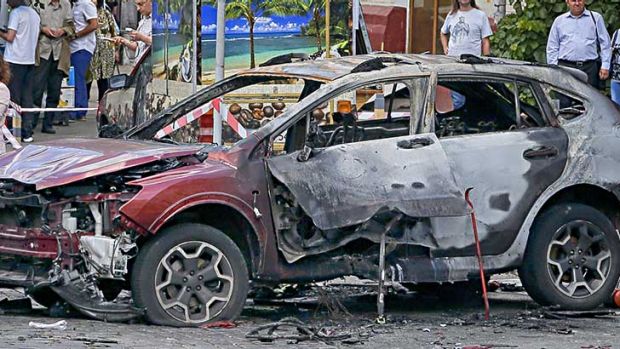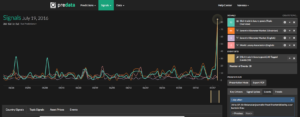Ukraine: Counterfeit SIGINT Ahead of Sheremet Car Bomb Assassination
This morning we were notified that that our signal for illicit trade in counterfeit goods skyrocketed 5.02 sigmas from the mean yesterday — an exceptionally rare event. The spike was mostly triggered by Ukrainian inquiries into the Wikipedia page of the Seventh-Kilometer Market in Odessa, Ukraine.
The Seventh-Kilometer Market is a renowned open-air market of counterfeit luxury goods, blue jeans, electronics, tobacco and narcotics. Open every day but Friday, the market now has 16,000 traders or so and a central staff of 1,200, mostly security guards and janitors, making it the region’s largest employer. It has an about 150,000 shoppers spending an estimated US$20 million a day in untraceable cash.
The SIGINT spike came one day BEFORE the car bombing assassination Belarusian journalist Pavel Sheremet in Kiev, Ukraine.
What is the likely connection between Ukrainian curiosity of Odessa’s main counterfeit market and the assassination of a journalist?
According to the media, on December 26, 2015, the Single Register of Enterprises and Organizations of Ukraine recorded a transfer in directorship of ‘7-km’ to the grandson of the founder of the market Viktor Dobriansky, who controls nearly a third of the share capital of the company. The current administration has stated that the data were entered in the Register of Ukrainian Enterprises using forged documents.
Ukraine’s Interior Ministry has investigated ‘7-km’ for terrorist financing.
Dobriansky, in turn, argues that he struggles with so-called “Yenakiyevo group,” headed by former People’s Deputy Yuri Ivanyuschenko, who in 2010 acquired part of the share capital market.
The financial heart of the Yenakiyevo group is Metinvest, a conglomerate that encompasses mining, shipping and steel manufacturing, controlled by Rinat Akhmetov, the founder and President of System Capital Management (SCM), ranked among the wealthiest men in Ukraine. As of February 2015, he was listed as the 216th richest man in the world with an estimated net worth of US 6.5 billion.
According to his Wikipedia entry, there have been claims Akhmetov has been involved in organized crime. Akhmetov is also the owner and President of the Ukrainian football club Shakhtar Donetsk. In 2006–2007 and 2007–2012 Akhmetov was a member of the Ukrainian Verkhovna Rada (parliament) for the Party of Regions. During the 2014 pro-Russian conflict in Ukraine, some pro-Ukrainian activists accused Akhmetov of being a financial backer of the separatist militants in Donetsk.
In other words, if the connections hold, it means that the Russian-backed Donetsk separatist movement is being partly funded by the illicit and counterfeit goods for sale in Odessa’s Seventh-Kilometer Market. If Sheremet and others were looking into this on July 19th, it could be why he was killed on July 20th.
Mr. Sheremet, the only occupant of the car, reported for Vesti, a radio news show based in Kiev, and also worked for Ukrainska Pravda, a well-respected news outlet. In Russia, Mr. Sheremet had worked for ORT, a leading state-owned television station. Sheremet had fled Russia for fear of persecution.
According to The New York Times, the car belonged to Mr. Sheremet’s girlfriend, Olena Prytula, a founding editor of Ukrainska Pravda, whose journalists, like others in the former Soviet Union, have been singled out for retribution. Speaking on Echo of Moscow radio Wednesday morning, his colleagues speculated that Ms. Prytula might have been the intended target.
Russian opposition leader Mikhail N. Kasyanov issued a statement calling Mr. Sheremet’s killing “terrible” and praising him as a journalist who “didn’t compromise with his conscience.”
In short, our illicit trade in luxury goods signal gave us a tip as to the possible cause for Sheremet’s assassination.
![]()




